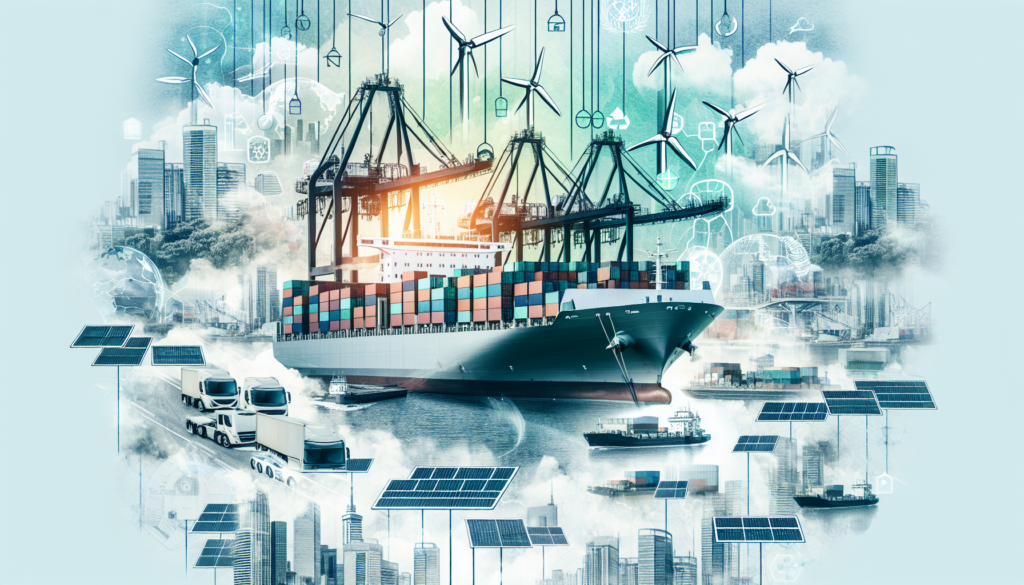Navigating the Seas Sustainably: The Rise of Carbon-Neutral Shipping
[ad_1] Navigating the Seas Sustainably: The Rise of Carbon-Neutral Shipping In today’s rapidly changing world, sustainability has become a key focus for businesses across industries. One area where sustainability is gaining significant traction is in the shipping and logistics sector. With the rise of e-commerce and online shopping, the demand for fast and efficient shipping services has never been higher. However, this increased demand has also led to a rise in carbon emissions from the transportation of goods. As consumers become more environmentally conscious, businesses are under pressure to reduce their carbon footprint and adopt more sustainable practices. This is where the concept of carbon-neutral shipping comes into play. Carbon-neutral shipping refers to the offsetting of carbon emissions generated from the transportation of goods by investing in projects that reduce or remove an equivalent amount of carbon from the atmosphere. One company that is leading the way in carbon-neutral shipping is Fulfillment Hub USA. Based in Miami, Florida, Fulfillment Hub USA is a leading provider of warehousing, logistics, and fulfillment services. With a commitment to sustainability, Fulfillment Hub USA has implemented innovative solutions to reduce its carbon footprint and offer carbon-neutral shipping options to its clients. The trend of carbon-neutral shipping has been gaining momentum in recent years, driven by a growing awareness of the environmental impact of traditional shipping practices. As global temperatures continue to rise and extreme weather events become more frequent, businesses are increasingly looking for ways to reduce their impact on the environment. One of the key benefits of carbon-neutral shipping is that it allows businesses to demonstrate their commitment to sustainability and attract environmentally conscious consumers. By offsetting their carbon emissions, businesses can reduce their environmental impact and contribute to the fight against climate change. In addition to the environmental benefits, carbon-neutral shipping can also have a positive impact on a company’s bottom line. By investing in carbon offset projects, businesses can reduce their operating costs and improve their overall efficiency. This can lead to long-term savings and a competitive advantage in the market. Fulfillment Hub USA is at the forefront of the carbon-neutral shipping trend, offering its clients the option to offset the carbon emissions generated from the transportation of their goods. By partnering with carbon offset organizations, Fulfillment Hub USA is able to provide its clients with a sustainable shipping solution that helps to protect the environment and reduce their carbon footprint. As the demand for sustainable shipping options continues to grow, Fulfillment Hub USA is well-positioned to meet the needs of businesses looking to reduce their environmental impact. By offering carbon-neutral shipping services, Fulfillment Hub USA is helping to lead the way towards a more sustainable future for the shipping and logistics industry. FAQ: Q: What is carbon-neutral shipping? A: Carbon-neutral shipping refers to offsetting the carbon emissions generated from the transportation of goods by investing in projects that reduce or remove an equivalent amount of carbon from the atmosphere. Q: How does carbon-neutral shipping benefit businesses? A: Carbon-neutral shipping allows businesses to demonstrate their commitment to sustainability, attract environmentally conscious consumers, reduce operating costs, and improve overall efficiency. Q: How is Fulfillment Hub USA contributing to carbon-neutral shipping? A: Fulfillment Hub USA is offering its clients the option to offset the carbon emissions generated from the transportation of their goods by partnering with carbon offset organizations. In conclusion, the rise of carbon-neutral shipping is a positive trend that is helping to reduce the environmental impact of the shipping and logistics industry. By offering sustainable shipping options, companies like Fulfillment Hub USA are leading the way towards a more sustainable future for businesses and the planet. To learn more about Fulfillment Hub USA and its carbon-neutral shipping services, visit https://fulfillmenthubusa.com or contact them at 3450 NW 115th Ave, Miami, FL 33178, United States. [ad_2]
Navigating the Seas Sustainably: The Rise of Carbon-Neutral Shipping Read More »

